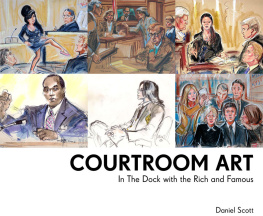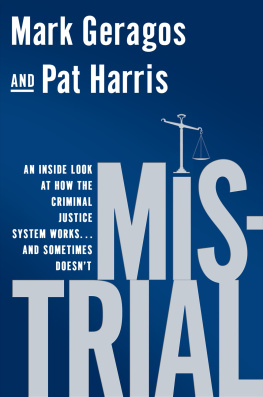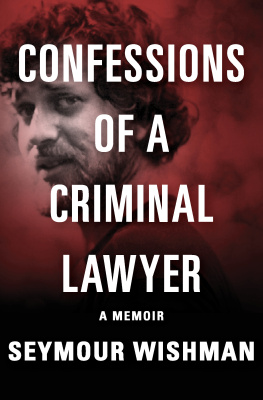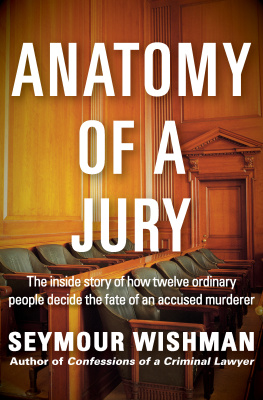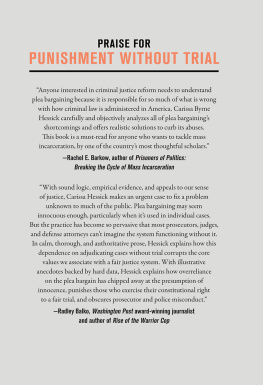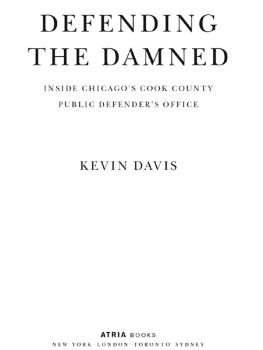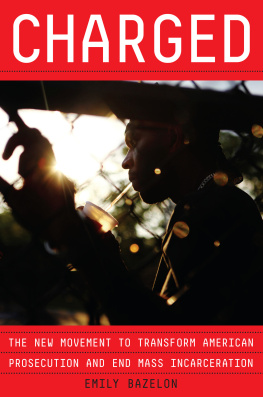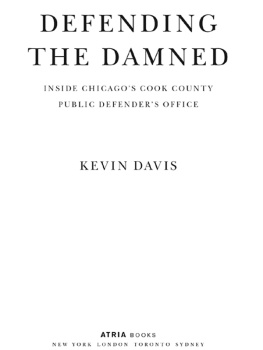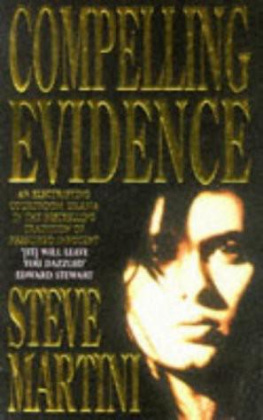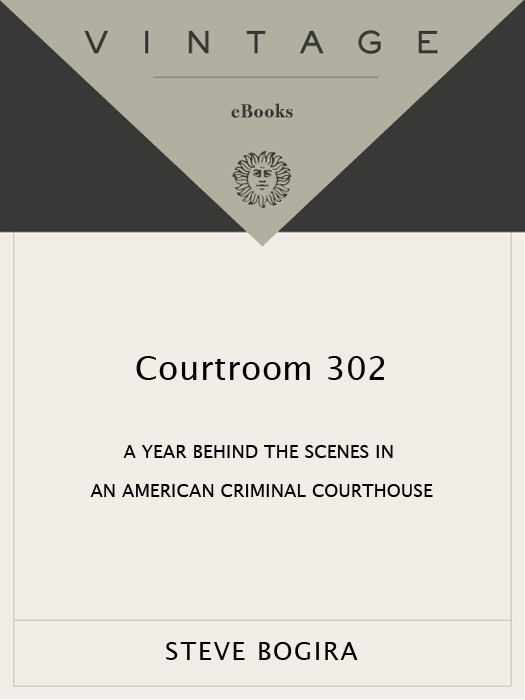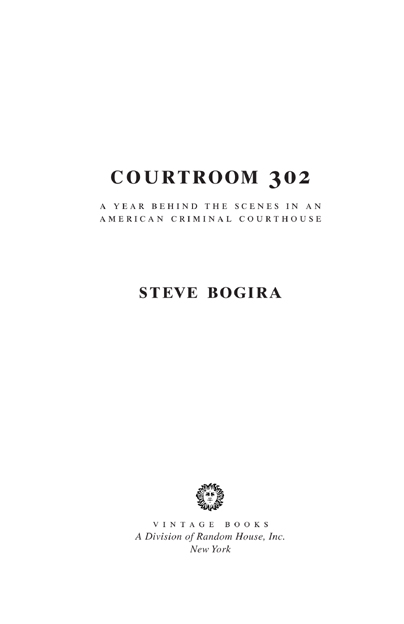Praise for Steve Bogiras
COURTROOM 302
Steve Bogira shines a blazing new light on Americas criminal justice system. This book is filled with one revelatory insight after another about how that system really works. Mr. Bogira shows that he is a masterful reporter not only of our countrys criminal justice system but also of human beings caught up in its gears.
Robert A. Caro
Powerful and moving. Bogira is more than a gifted writer. [He] is an inspiring reminder of what investigative reporting can and should do to keep our national institutions cleaner and better than they are.
Los Angeles Times
A gripping, insightful book. Required reading for anyone interested in the realities of the American justice system.
Newsday
Bogira writes with clarity, passion, and often lyrical beauty. With a good eye for detail and a dramatists attention to what motivates his characters, he reveals the common humanity of the rumpled and rank prisoners. Those who consider it long overdue to shine a light on this branch of government might start by reading his book.
The Providence Journal
Riveting. An immensely important book that exposes how Americas criminal justice system really works. Its steady stream of powerful insights inevitably apply to every big city court system in the nation.
Chicago Sun-Times
Brilliant. A genuine eye-opener. Bogira has produced a compelling narrative, that is often more entertaining than most of the cop shows which are so popular on American television.
The Economist
Fascinating.
Entertainment Weekly
An eye-opener. Bogira is a journalist who knows his trade as well as anyone Ive encountered in recent years. A remarkable book.
Studs Terkel
A dispassionate work of journalistic precision, a smart, subtle broadside against a criminal justice system that feeds upon the poor and dispossessed. Bogira has written a book that detail by detail, reveals the chasm between law and justice and, in the end, shames us all.
David Simon, Executive Producer and Creator,
The Wire; Producer and Writer, Homicide
So insider-ish, so candid, that it will shock, awe, and generally stick in the mind for a long time.
Milwaukee Journal Sentinel
The view of America that this book opens up is disturbing, and also fresh and fascinating. But Courtroom 302 isnt merely sociological. Its full of human drama, unearthed from the dreary and quotidian by an author with a remarkably fair and open mind.
Tracy Kidder, author of
The Soul of a New Machine and Mountains Beyond Mountains
Stunning. We get the smells, sights, and sounds of the big city criminal courts in precise, unforgettable detail. Anyone considering working as a prosecutor or a defense attorney must read this book. Regardless of the reason for reading Courtroom 302, ones perceptions of our criminal justice system, and the larger system that created and continues to shape it, will be permanently altered.
New York Law Journal
Steve Bogira is a brilliant reporter and observer, who also happens to be one masterful storyteller. Courtroom 302 is as honest and gritty as they come, and filled with surprises. Its one of the most important books on Americas criminal justice system to come along in years.
Alex Kotlowitz, author of There Are No Children Here
Revealing and intimate. By including a range of perspectivesthe judge, the jurors, the lawyers, the deputies, and the defendantsBogira creates a 360-degree view of the system.
The American Lawyer
A triumph of narrative journalism and a must-read for anyone concerned about the state of justice in America.
Jennifer Gonnerman, author of Life on the Outside
Too rarely a book appears that seems immediately essential, critical to an understanding of the culture and time in which we live. Steve Bogiras Courtroom 302 is such a book. A compelling account of the brutal reality that passes for justice in America.
Stuart Dybek

STEVE BOGIRA
COURTROOM 302
Steve Bogira graduated from Northwestern University and has been a prizewinning writer for the Chicago Reader since 1981. He is a former Alicia Patterson Fellow. He lives with his wife in Evanston, Illinois.
FIRST VINTAGE BOOKS EDITION, FEBRUARY 2006
Copyright2005 by Steve Bogira
All rights reserved. Published in the United States by Vintage Books, a division of Random House, Inc., New York, and in Canada by Random House of Canada Limited, Toronto. Originally published in hardcover in the United States by Alfred A. Knopf, a division of Random House, Inc., New York, in 2005.
Vintage and colophon are registered trademarks of Random House, Inc.
The Library of Congress has cataloged the Knopf edition as follows:
Bogira, Steve.
Courtroom 302 : a year behind the scenes in an American criminal courthouse / Steve Bogira. 1st ed.
p. cm.
1. Criminal courtsIllinoisChicago. 2. Criminal justice, Administration ofIllinoisChicago. 3. Criminal Justice personnelIllinoisChicago. 4. CriminalsIllinoisChicago. I. Title.
KFX1247.B64 2005
345.7731101dc22
2004057636
eISBN: 978-0-307-81419-7
Author photograph Jack Demuth
www.vintagebooks.com
v3.1
For Jane, my partner in crime
The horrible thing about all legal officials, even the best, about all judges, magistrates, barristers, detectives, and policemen, is not that they are wicked (some of them are good), not that they are stupid (several of them are quite intelligent), it is simply that they have got used to it. Strictly they do not see the prisoner in the dock; all they see is the usual man in the usual place. They do not see the awful court of judgment; they only see their own workshop.
G. K. CHESTERTON
Tremendous Trifles
The lockups are always open and there are always new faces. Where they all come from nobody knows and where theyll go from here nobody cares.
NELSON ALGREN
Chicago: City on the Make
CONTENTS
PROLOGUE
Welcome to County
EVERY DAY , Chicago police wagons swing onto the grounds of the Cook County Criminal Courthouse and deposit their cargo at a rear door.
The prisoners being unloaded on this particular eveningJanuary 20, 1998are here for the usual reasons. They sold cocaine rocks on a corner, until an unmarked car screeched up out of nowhere. They tried to buy heroin from an undercover cop. They pocketed a fifth of booze at a grocery and failed to outrun the security guard. They relieved a pickup truck of its tools and a nosy neighbor called 911.
At the district station, they pulled off their belts and pulled out their laces. They emptied their pockets of combs, cigarettes, matchbooks. They pressed their fingers onto the ink pad, frowned for the camera, and joined the rest of the days catch in a frigid lockup. They curled up on a metal bench or a concrete floor and waitedmidnight, four in the morning, noonwhile computers checked their prints for outstanding warrants. They were treated to a baloney-on-white and coffee in a Styrofoam cup. Those with misdemeanor charges and no warrants were given a court date and released. The others were cuffed wrist to wrist and loaded into the large police wagon that swung by the station. The chain of prisoners in the wagon lengthened as the driver made pickups at other stations. The wagon bumped along toward the courthouse at 26th and California.


